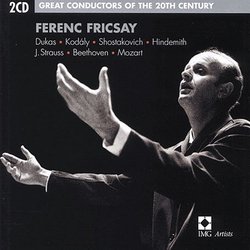| All Artists: Paul [composer] Dukas, Zoltan Kodaly, Dmitry Shostakovich, Paul Hindemith, Johann II [Junior] Strauss, Ludwig van Beethoven, Wolfgang Amadeus Mozart, Ferenc Fricsay, Berlin Radio Symphony Orchestra, Vienna Philharmonic Orchestra, RIAS Symphonie-Orchester, Berlin RIAS-Symphonie-Orchester Title: Great Conductors of the 20th Century: Ferenc Fricsay Members Wishing: 0 Total Copies: 0 Label: EMI Classics Release Date: 6/4/2002 Album Type: Original recording remastered Genres: Dance & Electronic, Classical Styles: Opera & Classical Vocal, Ballets & Dances, Dances, Historical Periods, Classical (c.1770-1830), Modern, 20th, & 21st Century, Symphonies Number of Discs: 2 SwapaCD Credits: 2 UPCs: 724357510929, 724357510950 |
Search - Paul [composer] Dukas, Zoltan Kodaly, Dmitry Shostakovich :: Great Conductors of the 20th Century: Ferenc Fricsay
 | Paul [composer] Dukas, Zoltan Kodaly, Dmitry Shostakovich Great Conductors of the 20th Century: Ferenc Fricsay Genres: Dance & Electronic, Classical
|
Larger Image |
CD Details |
CD ReviewsThe most remarakable hungarian conductor Hiram Gomez Pardo | Valencia, Venezuela | 06/06/2004 (5 out of 5 stars) "Gifted of a amazing sense of genuine bliss, Fricsay signed several qorks in the file's treasures. This double CD contains works never released before, and it 's a must for all these hard fans Fricsay (like me). Fricsay gives us a brilliant performing of the ninth of Shostakovich ; his Hindemith is suggestive and provided of inner passion; for all of us is well known that Fricsay as Dorati were champions conductors in Kodaly's music, specially Dorati. In this sense Fricsay was more selective. But the great surprise arrives when you listen the Eroica. Believe me when I say we are in front of one of the most overwhelming and powerful readings of this piece ever recorded before. Still it's understandable how this performance hasn't released before. Fricsay's approach is plenty of wisdom. The first movement is eloquent and surrounded of the epic majesty which demands. The second movement is mesmerizing; the hidden voices , the hero's death is revealed with expressive force, commitment and deepness ; you know as well than me, this is the central locus of the Eroica , the gravity center of this monumental work. In the third movement , Fricsay makes sing the orchestra with that glorious beating ; in the last movement Theme with variations , Fricsay depicts every one of them , giving its genuine expressive weight , the last variation , is filled of euphoria and wildness. And that's what exactly Beethoven expected of the leader conductor. The mythological character of this giant symphony runs through all the performance. And I want emphasize this aspect, it's not a question of making a firework staement about the finale. If you are not invaded by the internal values that support this work, you'll never win this challenge. If Fricsay would have lived longer, the Berlin Philarmonic status would have kept the same level hold by Furtwangler when he died. A must in your collection. Undoubtly one timeless unvaluable musical document." Fricsay gets one of the best installments in this series Santa Fe Listener | Santa Fe, NM USA | 10/30/2005 (5 out of 5 stars) "After the international success of Great Pianists of the Twentieth Century, there was high expectation for the Great Conductors follow-up. For whateer reason--poor sales, less than riveting performances, dubious choices of conductors--the series more or less flopped and was cut short. Thus we have a Great Condcutors survey without Bernstein, Solti, Abbado, and Carlos Kleiber, among others.
Some of the two-fer sets ae winners, though, including this one devoted to Ferenc Fricsay, whose career flourished in post-war Germany but was cut short by his premature death in 1963 before he turned fifty. It's a cliche to say "fiery Hungarian," but Fricsay did conduct with a lot of temperament, as shown by the wonderful live Galanta Dances of Kodaly, with the Vienna Phil. This 1961 broadcast is a highlight, but so is almost everything on Disc 1, inclduing a lively Shostakovich Sym. 9 and a strikingly forceful Symphonic Metamorphoses of Hindemith (although its sonics are a bit blurry compared to the generaly excellent sound, mono and stereo, throughout--unusual for a compilaiton that relies so heavily on live performances. The second CD is filled with more conventional repertoire: Beethoven's Leonore #3, an Eroica, and the Cosi fan tutte Overture. Fricsay was associated for much of his career with the RIAS Sumphony Orchestra formed under the Allied occuption of Berlin, later changed to the Berlin Radio Symphony Orchestra. They sound scrapy in the early selections from 1950 and 1952 but come together for both the Beethoven performances, which come from a single concert on Feb. 1961--it also happens to have the best sound. Fricsay wasn't fiery in Beethoven, however; here, at least, he chooses broad tempos (sluggish in the Scherzo), but there is so much inner intensity and drama that the Eroica comes off extremely well. In short, there's not a single performance here that doesn't add to Fricsay's high stature. Five stars without a doubt." |

 Track Listings (12) - Disc #1
Track Listings (12) - Disc #1